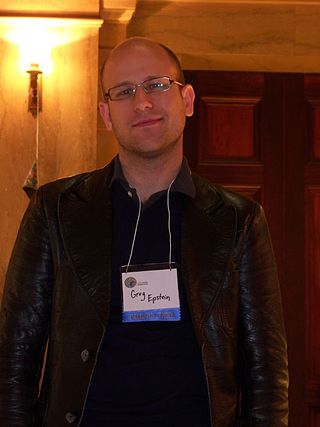Related Research Articles
Secularism is the principle of seeking to conduct human affairs based on naturalistic considerations, uninvolved with religion. It is most commonly thought of as the separation of religion from civil affairs and the state and may be broadened to a similar position seeking to remove or to minimize the role of religion in any public sphere. Secularism may encapsulate anti-clericalism, atheism, naturalism, non-sectarianism, neutrality on topics of religion, or antireligion. As a philosophy, secularism seeks to interpret life based on principles derived solely from the material world, without recourse to religion. It shifts the focus from religion towards "temporal" and material concerns.
Religious humanism or ethical humanism is an integration of humanist philosophy with congregational rites and community activity that center on human needs, interests, and abilities. Religious humanists set themselves apart from secular humanists by characterizing the nontheistic humanist life stance as a non-supernatural "religion" and structuring their organization around a congregational model.

The Brights movement is a social movement whose members since 2003 refer to themselves as Brights and have a worldview of philosophical naturalism.

The American Humanist Association (AHA) is a non-profit organization in the United States that advances secular humanism.
Irreligion is the absence or rejection of religious beliefs or practices. It encompasses a wide range of viewpoints drawn from various philosophical and intellectual perspectives, including atheism, agnosticism, religious skepticism, rationalism, secularism, and non-religious spirituality. These perspectives can vary, with individuals who identify as irreligious holding diverse beliefs about religion and its role in their lives.

Michael Arthur Newdow is an American attorney and emergency medicine physician. He is best known for his efforts to have recitations of the current version of the Pledge of Allegiance in public schools in the United States declared unconstitutional because of its inclusion of the phrase "under God". He also filed and lost a lawsuit to stop the invocation prayer at President Bush's second inauguration and in 2009 he filed a lawsuit to prevent references to God and religion from being part of President Obama's inauguration.

The Secular Coalition for America is an advocacy group located in Washington D.C. It describes itself as "protecting the equal rights of nonreligious Americans."

Lori Lipman Brown is an American politician and activist from the state of Nevada. She has served as a state senator, lobbyist, lawyer, educator, and social worker supporter. Additionally, her political views have been secularist and civil libertarian and describes herself as an atheist humanist Jew. She served as a Nevada State Senator from 1992 to 1994, advocating for repeals of consensual sex crimes. This led to her being named Civil Libertarian of the Year by the Nevadan chapter of the American Civil Liberties Union. Additionally, she has organized numerous events for the Humanist Association of Las Vegas and Southern Nevada, the Secular Student Alliance, and the American Humanist Association. She was defeated for reelection to the State Senate by Kathy Augustine in 1994.
Accurate demographics of atheism are difficult to obtain since conceptions of atheism vary considerably across different cultures and languages, ranging from an active concept to being unimportant or not developed. Also in some countries and regions atheism carries a strong stigma, making it harder to count atheists in these countries. In global studies, the number of people without a religion is usually higher than the number of people without a belief in a deity and the number of people who agree with statements on lacking a belief in a deity is usually higher than the number of people who self-identify as "atheists".
Discrimination against atheists, sometimes called atheophobia, atheistophobia, or anti-atheism, both at present and historically, includes persecution of and discrimination against people who are identified as atheists. Discrimination against atheists may be manifested by negative attitudes, prejudice, hostility, hatred, fear, or intolerance towards atheists and atheism or even the complete denial of atheists' existence. It is often expressed in distrust regardless of its manifestation. Perceived atheist prevalence seems to be correlated with reduction in prejudice. There is global prevalence of mistrust in moral perceptions of atheists found in even secular countries and among atheists.

Greg M. Epstein is an American Humanist chaplain at Harvard University and the Massachusetts Institute of Technology who is the president of the Harvard Chaplains Organization. He is an ordained Humanist rabbi, and has been influential in American humanism as a blogger, spokesperson, adviser and author of the New York Times bestsellerGood Without God: What a Billion Nonreligious People Do Believe. Epstein was an expert on the first three seasons of the reality show "Married at First Sight."
A. B. Shah (1920–1981) was the founder-president of the Indian Secular Society. The organization had its headquarters in Pune in Shah's lifetime but has now shifted to Mumbai. Until his death, A. B. Shah was the editor of The Secularist, a journal published by the Indian Secular Society (ISS). He also the edited the New Quest published by the Indian Association for Cultural Freedom. Shah took much interest in the problems of Indian Muslims. Shah's writings include What Ails our Muslims? and Religion and Society in India. Shah also edited Jayaprakash Narayan's Prison Diary, written by the prominent Indian leader in jail during the Emergency of 1975. Professor Shah was a mathematician and a scholar, who became interested in comparative religion and social reform, leading to founding Indian Secular Society.
The term New Atheism describes the positions of some atheist academics, writers, scientists, and philosophers of the 20th and 21st centuries. New Atheism advocates the view that superstition, religion, and irrationalism should not be tolerated. Instead, they advocate the antitheist view that the various forms of theism should be criticised, countered, examined, and challenged by rational argument, especially when they exert strong influence on the broader society, such as in government, education, and politics. Critics have characterised New Atheism as "secular fundamentalism" or "fundamentalist atheism". Major figures of New Atheism include Richard Dawkins, Sam Harris, Christopher Hitchens, and Daniel Dennett, collectively referred to as the "Four Horsemen" of the movement.
The United Coalition of Reason, or UnitedCoR for short, is a national organization in the United States that works to raise the visibility of local groups in the community of reason. Nationally this is done by conducting campaigns that highlight the fact that nontheists live in every community across America. Locally this is done by organizing and nurturing local groups to communicate with each other and hold events and other outreach activities.
As of 2020, 20% of Singaporeans have no religious affiliation. The rate of irreligion is different among ethnic groups of Singapore: about 26% of Chinese residents have no religion, compared to just 0.4% of Malay residents and 2.2% of Indian residents. Age is also an important factor, as around 24% of people aged 15 to 24 indicated they had no religious connection, compared to 15% of residents aged 55 and over in the last census.

David Niose is an attorney, author, and activist who has served as president of the American Humanist Association and the Secular Coalition for America. In these positions he has pursued legal and advocacy efforts on behalf of secularism.

The first Reason Rally was a public gathering for secularism and religious skepticism held on the National Mall in Washington, D.C., on March 24, 2012. The rally was sponsored by major atheistic and secular organizations of the United States and was regarded as a "Woodstock for atheists and skeptics". A second Reason Rally was held June 4, 2016 at the Lincoln Memorial in Washington, D.C.
The Congressional Freethought Caucus is a membership organization in the United States House of Representatives established to promote policy solutions based on reason and science, and to defend the secular character of government. Representatives Jared Huffman and Jamie Raskin have co-chaired the caucus since it formed in April 2018.
References
- ↑ "Secular movement". Psychology Today. Retrieved 2015-04-14.
- ↑ "Secular Movement". The Association of Religious Data Archives.
- 1 2 ""Nones" on the Rise". Pew Research Center's Religion & Public Life Project. 9 October 2012.
- ↑ "Trends in the Religious Unaffiliated, the "Nones," by Age". Black, White and Gray. 7 March 2013.
- ↑ Paul Bedard (9 October 2012). "Majority of atheists are liberal". Washington Examiner.
- ↑ "Social and Political Views of the Unaffiliated". Pew Research Center's Religion & Public Life Project. 9 October 2012.
- ↑ Goodstein, Laurie (27 April 2009). "More Atheists Shout It from the Rooftops". The New York Times.
- ↑ "Find your people - Meetup". meetup.com.
- ↑ "Nonreligious Questions". www.patheos.com.
- ↑ "Freethought Society of the Midlands (FSM)". Meetup.
- ↑ "Alabama Atheists and Agnostics". Facebook.
- ↑ "Mississippi Gulf Coast Atheist and Freethinking Association". Meetup.
- ↑ "American Humanist Association". Facebook.
- ↑ "Freedom From Religion Foundation". Facebook.
- ↑ "This fall, get ready for more atheist clubs at high schools". jewishworldreview.com.
- ↑ "Non-believers taking college campuses by storm". salon.com. 16 February 2013.
- ↑ "Openly Secular". openlysecular.org.
- ↑ "Bill Maher Urges Atheists to Speak Up; Knocks the Bible as Book Based on 'Ancient Myths' in New Ad for Openly Secular". Christian Post. 20 January 2015.
- ↑ "Atheist Christmas billboard ads target America's Bible Belt - Christian News on Christian Today". christiantoday.com. 2 December 2014.
- ↑ "First 'atheist ad' on 'Daily Show,' 'Colbert Report' features Ron Reagan". ffrf.org. 20 May 2014.
- ↑ "Humanists Launch Largest National Advertising Campaign Critical of Religious Scripture". American Humanist Association. 9 November 2010.
- ↑ "Home". unitedcor.org. Archived from the original on 2015-02-24.
- ↑ "Illinois atheist group's". Illinois Review.
- ↑ "Stark's atheist views break political taboo". SFGate. 14 March 2007.
- ↑ "Rep. Pete Stark (D-Cal.): first openly nontheistic member of Congress". secular.org. Archived from the original on 28 September 2007.
- ↑ "Atheists Start PAC To Elect Nonreligious Candidates". NPR.org. 18 September 2013.
- ↑ "Group Claims 28 Atheists in Congress; 27 Closeted". Christian Post. 5 October 2011.
- ↑ "Appeal from the United States District Court for the Eastern District of California" (PDF). Archived from the original (PDF) on 2013-06-05.
- ↑ "National Day Of Prayer Lawsuit Thrown Out By Federal Appeals Court". The Huffington Post.
- ↑ "Lawsuit to remove 'In God We Trust' from money gets dismissed - KSL.com". ksl.com.
- ↑ "'Under God' in Pledge of Allegiance is constitutional, says Massachusetts's highest court". The Washington Post .
- ↑ "N.J. Court Rejects Challenge to Pledge of Allegiance in Schools". Education Week - The School Law Blog. 9 February 2015.
- ↑ "Town of Greece v. Galloway". SCOTUSblog.
- ↑ Meaghan M. McDermott, Rochester (N.Y.) Democrat and Chronicle (16 July 2014). "Atheist gives invocation, first since high court decision". USA TODAY.
- ↑ "American Atheists - Atheists Decry Court's Grant of Religious Rights to Corporations in Hobby Lobby". American Atheists. 30 June 2014.
- ↑ "About". reasonrally.org. Archived from the original on 2012-04-02.
- ↑ Emma Green (24 November 2014). "The Origins of Aggressive Atheism". The Atlantic.
- ↑ "iTunes - Movies - The Unbelievers". iTunes. 13 December 2013.
- ↑ "Will Atheists March on Washington in 2016? Planning for the Second Reason Rally Has Begun". Friendly Atheist.
- 1 2 "Reason Rally". reasonrally.org.
- ↑ "Richard Dawkins has lost: meet the new atheists". The Spectator.
- ↑ "Christopher Hitchens' lies do atheism no favors". salon.com. 23 June 2013.
- ↑ Caitlin Dickson. "Richard Dawkins Gets into a Comments War with Feminists". The Wire. Archived from the original on 2016-07-31. Retrieved 2015-02-21.
- ↑ "Dawkins, Harris, Hitchens: New Atheists flirt with Islamophobia". salon.com. 30 March 2013.
- ↑ "A Humanist Approach to Islam". American Humanist Association. 25 November 2014.
- ↑ "Ayaan Hirsi Ali: Tackle Islam or Face Civil War". Politico. 6 June 2017.